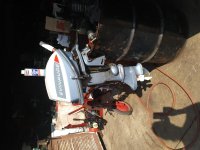Hello,
I appreciate any help I can get - I am not the most mechanically inclined but I can do very basic engine repairs.
I have an older (late 80's) 50 HP Evinrude tiller motor. It has worked great for years. Recently after being stored for a while I took it out and immediately noticed it was moving much slower than normal. The engine doesn't seem to be reaching as high of rotations per minute in Forward.
The obvious answer would be the carbs need to be cleaned, but the engine clearly revs all the way up in neutral and reverse.
That's why I'm here. I'm wondering if someone has seen this problem before or knows how to fix it before I start figuring out how to pull the carbs out. Just seems weird that it would work fine in reverse and neutral but not in forward.
Thank you much!
I appreciate any help I can get - I am not the most mechanically inclined but I can do very basic engine repairs.
I have an older (late 80's) 50 HP Evinrude tiller motor. It has worked great for years. Recently after being stored for a while I took it out and immediately noticed it was moving much slower than normal. The engine doesn't seem to be reaching as high of rotations per minute in Forward.
The obvious answer would be the carbs need to be cleaned, but the engine clearly revs all the way up in neutral and reverse.
That's why I'm here. I'm wondering if someone has seen this problem before or knows how to fix it before I start figuring out how to pull the carbs out. Just seems weird that it would work fine in reverse and neutral but not in forward.
Thank you much!


